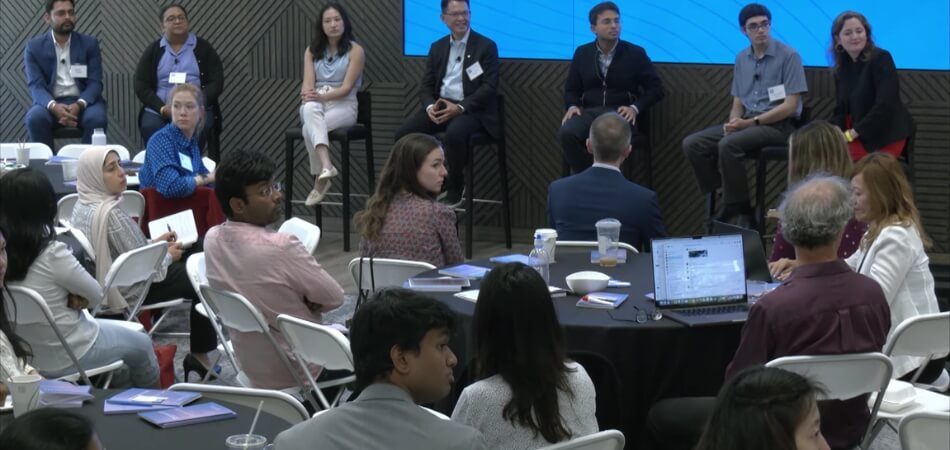Professionals from various sectors meet at healthcare conferences to discuss the latest trends, innovations, and challenges. But what if you’re not in the medical field? Now you may wonder, “Are healthcare conferences suitable for non-medical professionals?”
Yes, healthcare conferences can be suitable for non-medical professionals depending on their focus and content. Many healthcare conferences cover various topics beyond clinical medicine, including healthcare administration, policy, technology, innovation, and patient advocacy.
Curious to learn more about how these conferences can benefit you? Follow along as we explore the many reasons why healthcare conferences can be a valuable experience for non-medical professionals.
Core Purpose of Healthcare Conference
Healthcare conferences serve as dynamic platforms that bring together professionals from various sectors within the industry. These events facilitate the exchange of knowledge, ideas, and innovations. Attendees leave with fresh perspectives and actionable insights, ready to implement in their fields.
Collaboration across various healthcare disciplines is a primary objective at international healthcare conferences. Participants engage in discussions about challenges and exchange solutions. Networking among experts from different regions is enhanced by attending these events. This multidisciplinary approach enables improvements in patient outcomes and system efficiency.
A key focus of healthcare conferences is professional development and education. Attendees stay informed about the latest research, technologies, and methodologies. That’s why many professionals looking to join a health care conference in Canada with invitation letter. These events drive skill acquisition and continuous improvement, advancing standards and developing innovation in healthcare.
Why Do Healthcare Professionals Attend Conferences?
Healthcare professionals attend conferences to enhance their knowledge and stay updated on the latest industry trends. These events offer valuable insights, networking opportunities, and a platform to exchange ideas for improved patient care.
- Access to New Research and Innovations: Conferences introduce attendees to the newest research and innovations. This knowledge helps them apply better treatment methods in their daily practice.
- Opportunities for Networking: Networking with industry leaders and peers fosters collaboration. These connections create opportunities for future partnerships and professional growth.
- Skill Development through Workshops: Workshops and hands-on sessions offer new skills. Professionals leave with practical tools to improve their clinical practice and patient care.
- Exposure to Diverse Perspectives: Experts from different fields share diverse perspectives. This broadens attendees’ understanding and enhances their approach to complex medical challenges.
- Staying Updated with Technology: Exposure to new technologies and methodologies keeps professionals current. These innovations improve diagnosis, treatment, and healthcare delivery processes.
- Motivation for Continuous Learning: Discussions at conferences inspire continuous professional development. Attendees stay motivated to learn and apply the latest advancements in their work.
Conferences are essential for healthcare professionals aiming to stay at the forefront of their fields. They offer a space to learn, grow, and continually enhance the quality of care provided to patients.
Are Healthcare Conferences Suitable for Non-medical Professionals?
Yes, healthcare conferences can be suitable for non-medical professionals, depending on their focus and content. These events aren’t just for doctors and nurses; they cover a broad spectrum of topics relevant to various fields. From healthcare administration to policy-making and technology, there’s something for everyone.
Non-medical professionals can gain valuable insights and network with experts. Whether you’re in tech, business, or advocacy, these conferences offer a wealth of knowledge. Let’s dive into the factors that make these conferences so inclusive and beneficial.
Diverse Topics Beyond Clinical Medicine
Healthcare conferences often cover more than just clinical medicine. They include discussions on healthcare administration, which is crucial for effective hospital management. Policy sessions help attendees understand the regulatory environment affecting healthcare. Technology and innovation sessions showcase the latest advancements in improving patient care and operational efficiency.
Networking Opportunities
These events are excellent for networking with a wide range of professionals. Attendees can connect with experts from different sectors, broadening their professional network. Networking can lead to collaborations that advance both personal careers and the industry. The purpose of healthcare conferences is to encourage connections that drive innovation and improvement.
Professional Development
Conferences offer a plethora of sessions aimed at professional growth. These include workshops on new technologies and methodologies, providing hands-on experience. Attendees can also participate in discussions about emerging trends and best practices. This exposure helps professionals stay current and competitive in their fields.
Global Exposure
Attending international healthcare conferences gives professionals insights into global healthcare trends. They can learn about different practices and policies from around the world. This global perspective is invaluable for those looking to implement the best practices in their work. It broadens their understanding and approach to healthcare issues.
Who Should Attend the Healthcare Conference?
The healthcare conference offers a unique opportunity for professionals across the medical field to come together. It’s a place for learning, networking, and discovering the latest in healthcare innovations. Here’s a guide to who should attend and why.
Doctors and Physicians
Physicians benefit from the latest updates on medical research and treatments. Networking with peers can lead to collaborations that improve patient care. Attending sessions by experts can inspire new approaches in their practice. Overall, it’s a valuable opportunity for professional growth and development.
Nurses and Healthcare Practitioners
Nurses gain insights into new patient care techniques and technologies. Workshops and seminars offer practical knowledge that can be applied directly in their work. Networking with other healthcare practitioners can provide support and share experiences. It’s a chance to improve their skills and knowledge base.
Medical Researchers
Researchers can share their findings and get feedback from other experts. The conference provides a platform to stay updated on current trends and developments. Collaboration opportunities abound, potentially leading to new research projects. Presenting at the conference also boosts visibility and credibility in their field.
Healthcare Administrators
Administrators learn about the latest in healthcare management and policy changes. They can network with other leaders to share strategies and solutions. Attending can lead to improvements in their organization’s efficiency and patient care quality. It’s an opportunity to stay ahead in the fast-evolving healthcare landscape.
Medical Students
Students can gain invaluable insights into various medical specialties. They have the chance to learn from leading professionals and researchers. Networking can help in finding mentors and future career opportunities. It’s a way to improve their education beyond the classroom.
Pharmacists
Pharmacists can stay informed about new medications and therapies. Sessions on regulatory changes can help them stay compliant and effective. Networking with other pharmacists and healthcare providers promotes a collaborative care environment. Staying current in their critical role is essential.
Healthcare Technology Professionals
Technology professionals discover the latest advancements in medical technology and innovations. They can network with healthcare providers to understand their needs better. Presentations on new tools and systems can inspire future projects. Anyone involved in healthcare IT and development should attend this event.
Public Health Officials
Public health officials can learn about new trends and policies affecting public health. Networking with peers provides support and idea-sharing. Sessions on global health issues can inform better decision-making and strategies. The event is crucial for those working to improve public health.
What Benefits Can Non-Medical Professionals Gain from Healthcare Conferences?
Non-medical professionals benefit from healthcare conferences by gaining industry insights, networking opportunities, and understanding emerging trends. This can increase their business acumen and encourage collaborations with healthcare experts.
- Learning Industry Trends: The latest healthcare trends can provide valuable insights for business strategies. Staying informed about the industry helps in making informed decisions and identifying new opportunities.
- Networking Opportunities: Connecting with healthcare professionals opens up avenues for partnerships and collaborations. Building relationships with industry experts can lead to future projects and ventures.
- Innovative Ideas: Exposure to modern healthcare innovations can inspire creative solutions in other industries. Learning about new technologies and practices can spark innovative approaches in one’s own field.
- Challenges in healthcare: Gaining insights into healthcare challenges helps in developing products or services that address these issues. It helps to know the industry’s pain points.
- Improving Communication Skills: Engaging with diverse professionals improves communication and presentation skills. Communicating ideas across different fields effectively is crucial to professional development.
- Expanding Market Knowledge: Attending sessions on healthcare topics broadens market understanding and potential customer bases. This expanded knowledge helps in tailoring products or services to meet specific needs.
- Career Development: Participation demonstrates a commitment to professional growth and staying updated with industry changes. It highlights an individual’s proactive approach to learning and development
Tips for Maximizing Healthcare Conferences
Maximizing healthcare conferences involves strategic planning and focused engagement. These tips ensure attendees maximize valuable learning and networking opportunities, from setting clear objectives to networking effectively.
Plan Ahead
Before the conference, review the agenda and identify key sessions and speakers. Exploring the benefits of attending healthcare conferences can guide you in choosing sessions that align with your goals. Make a schedule to ensure you attend the most relevant events. Prepare questions in advance to engage more effectively and stay organized.
Network Actively
Take advantage of networking opportunities by engaging with other attendees. Exchange contact information and follow up after the conference. Attend social events and discussion groups to expand your connections. Building relationships can lead to future collaborations and opportunities.
Take Detailed Notes
During sessions, jot down key points, ideas, and questions. Use a notebook or a digital device for efficiency. Reviewing your notes later helps reinforce what you’ve learned. Detailed notes are invaluable for sharing information with colleagues or for personal reference.
Engage with Exhibitors
Visit exhibitor booths to learn about the latest products and services. Ask questions to understand how these innovations can benefit your work. Collect brochures and contact information for future reference. Engaging with exhibitors provides insights into new tools and technologies.
Participate in Discussions
Join panel discussions and Q&A sessions to deepen your understanding of topics. Share your perspectives and experiences to contribute to the conversation. Listening to diverse viewpoints can broaden your knowledge. Active participation increases your learning experience.
FAQs for Are Healthcare Conferences Suitable for Non-Medical Professionals?
Healthcare conferences offer a wealth of information and opportunities for various professionals, not just those in the medical field. Here are some frequently asked questions about the suitability of healthcare conferences for non-medical professionals.
Can Business Professionals Benefit from Healthcare Conferences?
Yes, business professionals can greatly benefit from healthcare conferences. They can learn about the latest trends in healthcare management and policy. Networking with healthcare leaders can open new business opportunities and collaborations.
How Can Technology Experts Gain from Healthcare Conferences?
Technology experts can discover the latest advancements in healthcare IT and innovations. These conferences provide a chance to understand the specific needs of healthcare providers. Engaging with industry professionals can inspire new tech solutions for healthcare challenges.
Are There Networking Opportunities for Non-Medical Attendees?
Healthcare conferences are excellent for networking. Non-medical attendees can connect with industry experts and leaders. This networking can lead to future collaborations and improve professional growth.
Can Marketing Professionals Find Value in Healthcare Conferences?
Yes, marketing professionals can find significant value in healthcare conferences. They can understand the healthcare market better and identify emerging trends. Networking with healthcare providers can also lead to new marketing strategies and collaborations.
Do Healthcare Conferences Address Global Healthcare Issues?
Many healthcare conferences address global healthcare issues, providing a broader perspective. This includes sessions on international policies and practices. Such global exposure helps non-medical professionals implement best practices in their work.
Last Words
Healthcare conferences offer a wealth of knowledge and opportunities for both medical and non-medical professionals. The topics range from healthcare administration and policy to advanced technology and innovation. Non-medical attendees can gain valuable insight into industry trends, network with experts, and discover innovative ideas.
Non-medical professionals benefit from healthcare trends, networking opportunities, and innovative ideas. Furthermore, these conferences increase communication skills. Healthcare conference attendance encourages interdisciplinary collaboration and improves professional development for professionals from a variety of sectors.
There are a variety of topics for healthcare conferences, as well as networking opportunities. So, are healthcare conferences suitable for non-medical professionals? Yes, non-medical professionals can contribute to and benefit from these conferences. You can learn, network, and stay up to date with industry advancements at these events.








